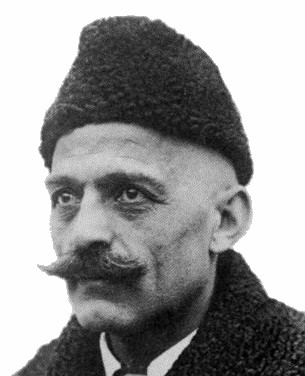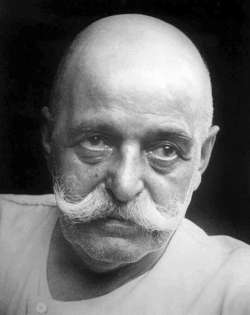I’ve alluded rather obliquely in some of my posts to various schools of inner development, without going into a lot of detail. I’d like to begin to talk about one such system with which I have had various levels of contact all of my life. The ideas in question are those brought to the West by the Greek/Armenian teacher G.I. Gurdjieff.

|

|
Here is a very brief synopsis of G.’s life, from the Gurdjieff Foundation of New York’s website:
G.I. Gurdjieff was born in Alexandropol, close to the frontiers of Russia and Turkey, circa 1866. Finding that neither science nor religion answered his questions about the meaning of man’s life, he became convinced that an ancient knowledge must exist and could still be found on Earth. After twenty years of search in remote parts of Central Asia and the Near East, he returned to Russia in 1912. Settling near Paris in 1922, he established the Institute for the Harmonious Development of Man at Fontainebleau. In 1924, he made the first of a series of visits to America. In 1929, he moved from Fontainebleau to Paris where he continued writing and working with a small number of students until his death in 1949.
I first noticed the name when I was a child, on the spines of some rather musty old books in my father’s study.
My father grew up in London, and after a stint as a medic in the Royal Navy during the Second World War returned to London to continue his medical education at Imperial College and St. George’s Hospital. There he became acquainted with a number of intellectually curious physicians and scientists, among them one Dr. Kenneth Walker. Dr. Walker was involved with a group that met on occasion to discuss some rather unusual ideas about human psychology and development, and invited my father to join him.
At this time M. Gurdjieff, who had settled in France in the 1920s, and who rode out the war in Paris, was near the end of his life. But he still worked with small groups in Paris, and occasionally crossed the Channel to London as well. It was one of these meetings that my father was invited to attend.
I wish to be clear that my father is not a credulous or superstitious man, and as a scientist he has a skeptical and questioning mind. But he sensed at once that there was something quite extraordinary about Gurdjieff, and said that he immediately formed the same impression that so many others have reported: that when you met him he looked right through you, that one felt one had no secrets in his presence.
My father was intrigued by both the remarkable personality of the man himself and by the system of ideas and methods he presented, and became a regular member of the London groups. He also traveled to Paris on several occasions to meet and work with groups there, and assisted Dr. Walker as he treated Gurdjieff in his final illness.
Much of the Gurdjieff work involves music, movement, and the effect of impressions of various sorts on the human organism. One of the earliest and most vivid experiences my father recalls from the London meetings was of Gurdjieff making a demonstration of the effects of musical tones.
For this meeting, which was held in a London townhouse, Gurdjieff had asked his hosts if he might tune the piano in a special way. Having spent the time to adjust it to his liking, he asked the group to gather round. He explained that the tempered scale used in Western music was a compromise, and that although such a tuning made it possible to play in many keys, and to move between keys on the same instrument, certain essential properties of musical vibration, known since ancient times, could not be achieved on an instrument tuned in this way. So he had adjusted the piano in such a way as to make these effects possible.
He asked for a small glass of water, and placed it on the piano. He then began to play an odd melody, punctuated by loud, sharp chords. All present later described the effect of these chords in the same way – as being similar to an electric shock passing though their bodies. It was as if the music was causing a direct, objective effect in each of them, and my father said the experience was quite unlike anything he had ever encountered before.
When he had finished playing, M. Gurdjieff raised the glass of water. It was frozen.
There is a very great deal I would like to say about all of this, but I must be very, very careful to say it all in the right way, and not to overreach myself to the detriment of all. Gurdjieff’s system is not a small topic, worthy of a diverting post or two, but is rather an ancient, immense and interconnected web of ideas, some very difficult. I won’t be rushing through it, and there may be long stretches between posts, but I will write what I can as I feel I am able.
8 Comments
Hi Malcolm –
Interesting anecdote from your father — I look forward to the next installment.
One of the things about G that has always put me a bit “off” is the amount of attention he gives to “wonder works.” I do think such things can be valuable, but primarily as wrecking balls that leave preconceived notions about what is or isn’t possible in rubble. On the other hand, maybe that’s why G engaged in such demonstrations.
Hi Bob,
Actually, I’m not aware of many other anecdotes of that sort. I think it is also important to bear in mind that Gurdjieff held very firmly to the idea of a lawful world – a demonstration such as I described would have been simply an example of a scientific principle at work, rather than anything magical or miraculous. His point was that there were physical aspects of the world, known since antiquity, that were being overlooked in modern times. A demonstration like that – while little more, really, than a parlor trick, to someone who understands the underlying principles – would have a definite effect on a roomful of scientists.
And you are quite right – Gurdjieff had quite an assortment of “wrecking balls”, and wasn’t shy about using them. A central idea in his system is that there is much in ourselves that we must tear down in order to build something more permanent.
Thanks, as always, for reading and commenting.
A British site http://www.lsbu.ac.uk/water/index.html collects a lot information about research on the physics of water. Water itself is still a big research topic in physics community and a new area named soft condensed matter. Gurdjieff’s demostration looks like he induced phase transition of water from liquid to ice by vibration. It looks like a rare physics phenomenom but completely possible.
Right, Eugene, that’s exactly what the demonstration was all about. G. gave this as an example of an understanding of the effects of vibration that was common in ancient times, but is not so anymore.
I have recently become reacquainted and quite enamored with the
Teachings of Gurdjieff, Ouspensky and Others. With favorites being Meetings with Remarkable Men by Gurdjieff and In Search of the Miraculous by Ouspensky. I am now wading through “All and Everything”.
Hi Zencat, and thanks for visiting.
There is much of great value in these books, and having them all in searchable Adobe format, as is offered on your website, could be very handy indeed. I might have to order a copy!
Of course, if you follow G.’s instructions at the beginning of Beelzebub’s Tales, you’ll be wading through it not once, but three times.
Should you wish to pursue the Gurdjieff teaching “for real”, I can point you to some valuable resources.
“Should you wish to pursue the Gurdjieff teaching “for real”, I can point you to some valuable resources.”
I would like that, sir.
Email me.